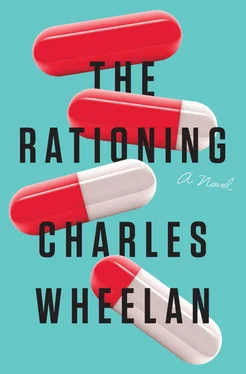“Once a felon, always a felon,” the Senate Majority Leader answered.
“Not in the eyes of the law,” the House Speaker said. “They have done their time and returned successfully to society.”
“That’s not the point,” the Secretary of Defense responded. His tone had turned analytic, more like for a military briefing, or at least how I would imagine a military briefing to be. “Suppose you have a deadly conflict going on around you. You have a bunker, but there is not enough room to keep everyone safe. Who goes in the bunker? It’s not about fairness, necessarily. Lots of people deserve a spot in that bunker. It’s about who you want in there with you, and more important, who you want with you when the conflict is over. Who comes out of the bunker to rebuild society? ”
The President said, “We’re talking about a few days without Dormigen. We are not going to have to rebuild society here.”
“Yes, but I take the point,” the Acting Secretary said. “You’re saying we should try to choose the strongest and most capable. This should be about merit, of some sort,” the Acting Secretary said.
“Yes, that’s it. Thank you,” the Defense Secretary answered, relieved that his point of view was finally getting some traction. It was not, of course. The Acting Secretary was merely disguising himself as that twig, luring everyone in the room closer and closer, until they realized at the last moment that he was in fact an insect disguised as a twig, and then it would be too late.
“Once a felon, always a felon,” the Acting Secretary repeated. “Are we in agreement?” There were nods of assent around the table and he wrote Felons on the whiteboard.
“Well, no,” the House Speaker said. All heads turned in her direction.
“If we can’t agree to exclude felons, we’re not going to get anywhere,” the President said.
The Senate Majority Leader added, “There is no way I can defend any plan that puts felons ahead of law-abiding citizens.”
“Felons or ex-felons?” the Chief of Staff asked.
“Both,” he said.
The House Speaker said, “It makes me uncomfortable, given the racial makeup of our prison population. But let’s go on. We can come back to this.”
The Acting Secretary continued, “Based on our earlier discussion, I suppose we need some kind of age limit. Is that right?”
“I don’t think it makes a lot of sense to be giving scarce medicine to eighty-year-olds,” the Senate Majority Leader offered.
“Those are the people who need Dormigen the most,” I reminded the group. “They are the ones for whom Capellaviridae is most likely to be fatal.”
“But still,” the Secretary of Defense insisted, “there’s just not a lot of runway there, if you know what I mean.”
“So what’s the cutoff? Sixty-five? Seventy?” the Acting Secretary asked the group.
“I’m not sure we have to choose that now,” the Chief of Staff said.
“When are we going to do it?” the President asked, essentially correcting her.
“Let’s say sixty-five,” the Speaker of the House suggested.
“That feels kind of young to me,” the Senate Majority Leader said, generating chuckles around the room, since we all knew he was well north of sixty-five. “Seriously, there is a lot of human capital invested in folks over sixty-five.”
“So seventy?” the Acting Secretary asked.
“Let me take the other side of that,” the Defense Secretary answered. “Every time you give a dose to a sixty-nine-year-old, there is one less dose for a thirty-nine-year-old, who has a lot more life ahead of him.”
“Sixty-five?” the Acting Secretary asked.
“Let’s just say sixty-five and move on,” the Senate Majority Leader offered.
“Agreed,” the President said.
“There is a case to be made that it should be lower,” the Defense Secretary said.
“Make it sixty-five for now. Move on,” the President said, more emphatically this time.
The Acting Secretary wrote >65 in red on the board.
“Just to clarify, does someone who is sixty-five get the Dormigen or not?” the Chief of Staff asked.
The Acting Secretary answered, “As I’ve written it, only folks over sixty-five are excluded. So if you’re sixty-five, you get the Dormigen, but we could say that you have to be under sixty-five.”
“I was just asking,” the Chief of Staff said.
“Boy, that would make your sixty-sixth birthday really suck, wouldn’t it?” the Strategist interjected. “Happy birthday, Grandpa, I bet you wish you were one day younger.” He was back to his old self.
“Okay, next,” the Acting Secretary said, looking around the table. “Or are we done?”
“Who else do you want in the bunker?” the Defense Secretary asked.
“College graduates?” the Chief of Staff asked.
“That would exclude about sixty-five percent of the country,” the Speaker of the House pointed out, after which a silence settled over the table.
“Do you want college graduates in the bunker with you or not?” the President asked.
“I’ve met plenty of college graduates who couldn’t find the entrance to the bunker if it had a sign over it,” the Senate Majority Leader said.
“You can say that again,” the Defense Secretary added.
“Well, what about high school dropouts?” the Chief of Staff asked, hoping to move the discussion along.
“Have we made a decision about college graduates?” the Acting Secretary asked, his red dry erase marker poised over the big whiteboard propped up on the easel.
“It might be easier to think about this going the other direction,” the Chief of Staff said. “Maybe high school dropouts are excluded?” Her tone suggested some reservations with the idea.
“You can’t get into the military without a high school degree,” the Defense Secretary pointed out.
“There is a significant difference between getting into the military and getting the medicine that might save your life,” the Speaker of the House said sharply.
“I was just providing information,” the Defense Secretary said.
“Do you know what the impact would be on our minority populations if we were to exclude high school dropouts?” the Speaker asked.
“I’m not sure this should be about race,” the Defense Secretary said.
“Pardon me?” the Speaker of the House said, her faux-Hispanic hackles clearly up.
“We’re trying to decide what to do here based on what’s best for the country. I don’t see what race or ethnicity has to do with it,” the Secretary of Defense said calmly.
“Of course you don’t,” she replied accusingly.
“Easy,” the President warned.
The Strategist said, “If I may state the obvious, passing out Dormigen using any kind of educational credentialing as a criterion is going to have a huge adverse impact on every minority population in this country. The same is true if we exclude felons. Your ‘bunker’ is going to be full of old white guys.”
“They can’t be over sixty-five,” the Acting Secretary interjected with flawless timing. There were uncomfortable smiles around the table.
“We are not excluding anyone from receiving Dormigen based on race, sex, or ethnicity,” the Defense Secretary said firmly. “I’m proposing a criterion based strictly on educational attainment. That’s entirely defensible. The racial implications are what they are.”
“You don’t think it would be a problem if our stocks of Dormigen went disproportionately to white middle-class Americans? Or is that the point?” the Speaker asked.
“That’s out of line,” the Defense Secretary said.
“I agree,” said the President.
The Strategist interjected, “There are a fair number of people, especially minorities, who don’t attend college, or don’t graduate, because they can’t afford it. Obviously we would be compounding that disadvantage.”
Читать дальше












